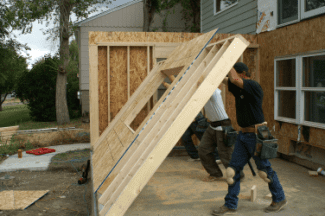Real estate investing: What you should know

It all looks so easy on HGTV: A couple buys a house, does a complete makeover, and sells it for a tidy profit. Sometimes things go wrong, but, in the end, everyone is happy.
So you might be thinking, “I could do that!” Or you might be looking to make money on rental properties instead. Real estate investing can indeed be profitable, but you need some business savvy, diligence, and a willingness to take risks.
Do you have what it takes?
Despite what you may read in advertisements, real estate investing is not a quick and easy road to riches. If you buy a house to flip, you might make a bundle because of rising home values, or the real estate market could crash as it did in 2009. Or you could uncover toxic mold that turns your rehab into a teardown.
If you buy rental property, it will probably increase in value over time, but unexpected repairs or vacancies can wreak havoc with your short-term finances. Be sure you’re ready for the risks, as well as the rewards.
Unlike other investments such as stocks, real estate is a physical thing that needs attention. Rehabbing a house or apartment building means doing a lot of physical labor or managing several contractors—or both. People who do it successfully usually have some skills or training in real estate or remodeling or repair.
If you own rental property, you’ll have to collect rent and manage the property, or you’ll pay a property manager an 8-10 percent fee to do it for you. When your tenant calls while you’re on vacation to say the toilet is leaking, you must be willing and able to get the problem fixed quickly.
Do your homework and set goals
Real estate is a huge investment, and there’s a lot to know about buying, selling, and managing property. Before you do anything, read books and articles, and/or attend seminars and classes, to get yourself up to speed.
Acquaint yourself with the real estate market in the area where you might want to invest. Go to open houses, drive around, talk to local realtors, and look at listings online. Get a good feel for the neighborhoods and what property is typically worth.
Your bank account and credit rating matter, so they should be in order before you attempt to buy anything. Mortgages for investment properties usually require a 20-30 percent down payment, and they carry a higher interest rate than loans for your principal residence.
Beyond that, decide what you want to get out of your real estate investment. Are you looking for an asset that will grow in value over time? An income stream to supplement your regular income? Do you want to flip houses or be a landlord? What kind of property do you want to invest in—commercial, residential, beach condos? Clarifying your goals will help you identify the right real estate investment.
Get a Free Multifamily Loan Quote
Access Non-Recourse, 10+ Year Fixed, 30-Year Amortization
Treat real estate like a business—and do the math
Success or failure at real estate investing often comes down to the math. Investment real estate should make you money—that’s the point of an investment—so it’s critical to avoid these common mistakes:
- Paying too much. Know the market, and don’t overpay because you fall in love with a house. Look for motivated sellers, wholesale properties, and “the worst house in the best neighborhood.”
- Underestimating expenses. The purchase price is just the beginning of the money you’ll spend on investment real estate. Before you buy, compare your expenses to the income you can expect to receive. In addition to the down payment and monthly mortgage payment, typical expenses include:
- Renovations. Some experts advise adding 50 percent to both the estimated renovation costs and the amount of time that will be needed to complete them.
- Ongoing rental property expenses, like homeowners’ association fees, taxes, insurance, maintenance, and utilities, plus occasional larger expenses like a new roof. You’ll periodically have vacancies with no tenants and no rent coming in. Expect to spend at least 35-50 percent of the monthly rent amount on these expenses, in addition to your monthly mortgage payment.
Real estate investing can supplement your monthly income or give you a stable long-term investment. But before you buy, educate yourself, set goals, and always make sure the numbers add up.
Source: Legal Zoom















 Accessibility
Accessibility